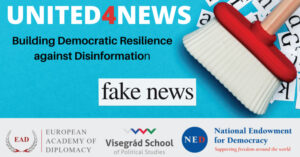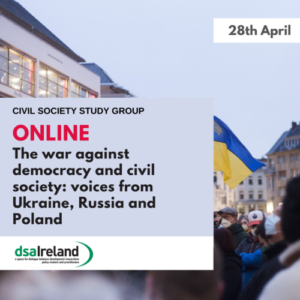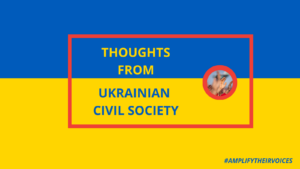Russian news propaganda is shielding residents from the horrors of the invasion of Ukraine, NBC News reports (above).
Eight years of practice in countering disinformation prepared civil society for Russia’s Feb. 24 invasion of Ukraine, Reuters reports:
 Yevhen Fedchenko helped co-found StopFake, a factchecking service, in March 2014 with colleagues and students at the Kyiv-Mohyla journalism school to “debunk just piece by piece” Russian disinformation and fake news. Shandra helped organise EuroMaidan Press, an English-language online newspaper, to try to offer foreign audiences articles and analysis penned by Ukrainians.
Yevhen Fedchenko helped co-found StopFake, a factchecking service, in March 2014 with colleagues and students at the Kyiv-Mohyla journalism school to “debunk just piece by piece” Russian disinformation and fake news. Shandra helped organise EuroMaidan Press, an English-language online newspaper, to try to offer foreign audiences articles and analysis penned by Ukrainians.
“We did a lot of things in those eight years and we learnt a lot about disinformation…We were absolutely sure about when it (the war) was going to happen,” Fedchenko told Reuters by telephone from his new, and what he hopes will be a temporary, home in western Ukraine, largely spared by the invasion so far.
The claim that Russian President Vladimir Putin is seeking the “denazification” of Ukraine clashed with reality after video shared by Storyful (below) showed a pro-Russian soldier Lieutenant Roman Vorobyov wearing neo-Nazi symbols while being awarded a medal for fighting in the city of Mariupol, NEWSWEEK reports:
Receiving the award on Sunday from Denis Pushilin, who is the Putin-sponsored head of the self-proclaimed Donetsk People’s Republic, two patches are visible on Vorobyov’s right arm. One is a modified version of a skull-and-crossbones emblem used by Nazi Germany’s 3rd SS Panzer Division Totenkopf, an elite division of the Waffen-SS. The other is the Valknut, or Odin’s knot, which is a symbol of interlocking triangles from Norse mythology commonly used by neo-Nazis.
Volodomir Zelensky’s great success in the information war has undeniably been to couch the conflict as one of Russia against not just Ukraine, but the West, notes Carl Miller, the director of the Centre for the Analysis of Social Media at the Demos think tank in London, and the author of The Death of the Gods. That has helped him win an array of fans across Europe and North America, among both politicians and ordinary voters. But that success, the very reason that we in the West think Ukraine is winning the information war, is also the very reason it isn’t, he writes for The Atlantic:
Disinformation campaigns are far more effective when they have a powerful truth at their core and use that truth to guide discussion. The blunt reality is that in many parts of the world, antipathy for the West is deep and sympathy for Russia is real. It is in these contexts where I’d expect influence operations to be targeted—and to work. A mistake we in the West too often make is to suppose that our information spaces—English, French, and German Twitter and Facebook, for example—are far more universal than they are.
 “Propaganda is a tried-and-true tactic in warfare, stretching back through history,” says Penn media scholar Courtney C. Radsch. “What is new and different about the digitally inflected environment of propaganda is that the scale, scope, speed, and sophistication of propaganda is on an unprecedented scale. What that means for people in Ukraine, Russia, and around the world is that information warfare is a central part of the broader conflict. Controlling the narrative and undermining efforts to convey any sort of truth or fact is part and parcel of information warfare.”
“Propaganda is a tried-and-true tactic in warfare, stretching back through history,” says Penn media scholar Courtney C. Radsch. “What is new and different about the digitally inflected environment of propaganda is that the scale, scope, speed, and sophistication of propaganda is on an unprecedented scale. What that means for people in Ukraine, Russia, and around the world is that information warfare is a central part of the broader conflict. Controlling the narrative and undermining efforts to convey any sort of truth or fact is part and parcel of information warfare.”
Putin apologist Sergei Markov (right) said the war will only end when “two thirds” of Ukraine has been seized by Russia and a new government installed.
The political technologist – once known as Sergei “Kremlin Insiderovich” Markov – confirmed that the regime is unable to tell the difference between reality and its own propaganda when he told a BBC documentary that Putin’s lies are actually a form of “ultra super truth”.
 The on-going Russian invasion of Ukraine shattered the lives of the people of Ukraine and laid bare the assumptions of peaceful co-habitation with authoritarian dictators dreaming of restoring the bipolar world order, DSAIreland reports.
The on-going Russian invasion of Ukraine shattered the lives of the people of Ukraine and laid bare the assumptions of peaceful co-habitation with authoritarian dictators dreaming of restoring the bipolar world order, DSAIreland reports.
The democratization of Ukraine and the development of its civil society proved as unacceptable to the Russian government as its own political opponents and international NGOs aka “foreign agents”. Authoritarian rulers thus disprove any doubts that an authentic civil society is a prerequisite for democracy.
To discuss the development of civil society in Ukraine, a forthcoming webinar features prominent speakers who have played seminal role in the external support for Ukrainian civil society, studied grassroots organising in Ukraine and conducted research among Russian political migrants.
When: April 28, 2022, 2-3:30pm Irish time/ 15-16:30 Polish time
Where: Online. Registration required. Register Here
Agenda (Shown as Irish Time)
2pm: Welcome from the Convenor of DSA I CSSG: dr hab. Galia Chimiak (IFiS PAN)
 2-2:15pm: HE Jan Piekło (former Polish Ambassador to Ukraine (2016-2019) and director of the Polish-Ukrainian Cooperation Foundation (2005-2016): Ukraine: how to help in times of war – challenges and responsibilities.
2-2:15pm: HE Jan Piekło (former Polish Ambassador to Ukraine (2016-2019) and director of the Polish-Ukrainian Cooperation Foundation (2005-2016): Ukraine: how to help in times of war – challenges and responsibilities.
2:15-2:30pm: Dr Iryna Pawlowska (Centre of Eastern Europe, Marie Curie-Skłodowska University in Lublin): Russian aggression against Ukraine in the perception of Ukrainian and Russian society
2:30-2:45pm: Dr Joanna Fomina (Institute of Philosophy and Sociology, Polish Academy of Sciences): Russian political migrants’ responses to Russia’s aggression against Ukraine: engagement into anti-war and humanitarian aid activities
2:45-3pm: Discussant: Prof. Donnacha Ó Beacháin (School of Law and Government, Dublin City University)
3-3:30pm: Q&A







